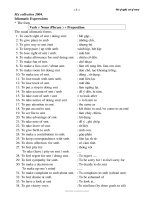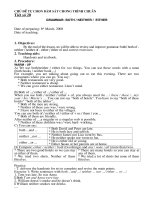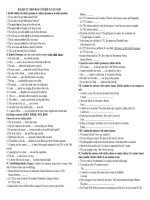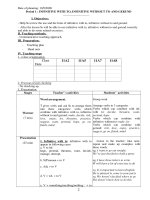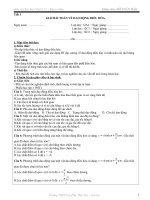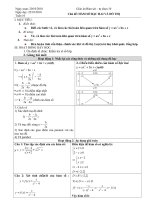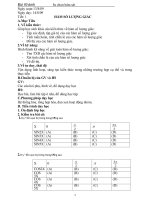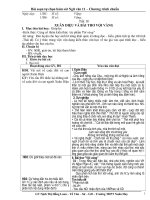Bai Tu Chon Bam Sat AV 10 CB Tiet 3
Bạn đang xem bản rút gọn của tài liệu. Xem và tải ngay bản đầy đủ của tài liệu tại đây (297.97 KB, 2 trang )
<span class='text_page_counter'>(1)</span><div class='page_container' data-page=1>
<b>THẨM TÂM VY’S DOCUMENT </b>
<b>BÀI HỌC TỰ CHỌN-BÁM SÁT 10 (3) ~ 1 </b>
Week 3 Period 3
Saturday, August 28th, 2010
<b>BÀI HỌC TỰ CHỌN-BÁM SÁT KHỐI 10 </b>
<b>I. The Present Simple Tense. </b>
<b>1. Forms: </b>
<b> Most Verbs </b> <b> To Be </b>
- Affirmative: S + V1…. S + am/is/are……
- Negative: S + do/does + not + V….. S + am/is/are + not…..
- Interrogative: Do/Does + S + V….? Am/Is/Are + S ….?
<b>2. Use: </b>
a. Diễn tả một hành động hoặc thói quen ở hiện tại
(<i><b>always, usually, often, sometimes, occasionally, seldom, rarely, every</b></i>, etc)
e.g: I usually go to school in the afternoon.
b. Diễn tả một chân lý, một sự thật luôn luôn đúng.
e.g. The earth moves around the sun.
3. Đối với ngơi thứ ba số ít: <b>He, She, It</b>, <b>that man</b>….
a. Thêm “S” vào sau động từ thường.
e.g. Lan often gets up early in the morning.
b. Thêm “ES” vào sau các động từ tận cùng là : ch, sh, s, x, o, z.
e.g. He watches a lot of TV on Sundays.
<b>III. The Present Perfect Tense </b>
<b>1. Forms: </b>
- Affirmative: S + has/have +V3/ed….
- Negative: S + has/have + not + V3/ed…..
- Interrogative: Has/Have + S + V3/ed….?
<b>2. Use: </b>
a. Diễn tả một hành động xảy ra trong quá khứ và kéo dài đến hiện tại (thường
dùng với các trạng từ như: <i><b>never, ever, not…yet, since, for, so far, until now, </b></i>
<i><b>up to now</b></i>, etc)
e.g. We have lived here for 20 years.
b. Diễn tả một hành động vừa mới xảy ra (<i><b>just</b></i>, <i><b>recently</b></i>, <i><b>lately</b></i>).
e.g. She has just gone out.
c. Diễn tả một hành động xảy ra trong quá khứ không xác định rõ thời gian
(<i><b>already</b></i>, <i><b>before</b></i>)
e.g. Have you met this man before?
<b>3. Chú Ý </b>
a. <b>Since</b> và <b>For:</b>
- SINCE: chỉ mốc thời gian, sau nó là số chỉ năm, tháng, mệnh đề thời gian
(<i>2009, September, I last saw you</i>, etc.)
- FOR: chỉ khoảng thời gian, sau nó là số chỉ bao nhiêu tuần, tháng, năm, (<i>3 </i>
<i>months, a long time, ages, </i>…)
b. S + has/have +V3/ed…… since + S + V2/ed….
e.g. We have known each other since we moved here.
c. Các trạng từ: <i><b>never</b></i>, <i><b>ever</b></i>, <i><b>just</b></i>, <i><b>already</b></i> thường đứng giữa trợ động từ (has/
have) và động từ chính (V3/ed).
e.g. I have <b>already</b> finished my homework.
<b>PRACTICE </b>
<b>I. Put the verbs in parentheses into the correct tense: </b>
1. He (practise)... the piano every day.
2. I (believe)... you.
3. Bob (see)... this movie before.
4. George (read)... the newspaper already.
5. Mr. Johnson (work)... in the same place for 35 years.
6. We (not begin)... to study for the test yet.
7. John (hate)... smoke.
8. Jill always (get up)... at 6.00 a.m.
9. Joan (travel)... around the world.
10. We (not see)... this movie yet.
11. Terry (mow)... the lawn yet.
12. John and I (be)... pen pals for nearly 3 years.
13. He (wear)... the same coat since he (move)... here.
14. I (not see)... your brother recently.
15. It (not rain)... much in our country in winter.
16. I never (talk)... to such an interesting person.
<b>The Passive Voice Of The Present Simple Tense </b>
<b>And The Present Perfect Tense </b>
Present
Simple Subject am/is/are past
participle by + object
Present
Perfect Subject
</div>
<span class='text_page_counter'>(2)</span><div class='page_container' data-page=2>
<b>THẨM TÂM VY’S DOCUMENT </b>
<b>BÀI HỌC TỰ CHỌN-BÁM SÁT 10 (3) ~ 2 </b>
<b> Chú Ý: </b>
Hầu hết các <b>Ngoại Động Từ</b> (transitive verbs) đều có thể chuyển được sang
Passive:
e.g. <i>drive </i>là một NgĐT vì ta có thể drive <b>something </b>(drive a car).
Tuy nhiên, một vài ngoại động từ KHÔNG thể dùng ở Passive. Những Động
từ này gồm: <i>become, fit </i>(= hợp, vừa), <i>get, have, lack, let, like, resemble, suit.</i>
Các <b>Nội Động Từ</b> (intransitive verbs) KHÔNG thể dùng ở Passive:
e.g. <i>fall (ngã, rơi) </i>là NĐT, ta không thể 'fall something'.
Vì thế KHƠNG thể nói và viết: <i>The tree was fallen. </i>Mà phải dùng ờ Active:
<i>The tree fell. (Cây ngã.) </i>
<b>PRACTICE </b>
<b>Turn the following sentences into the passive voice: </b>
1. People always admire heroism.
2. He always tells about his family.
3. Some people dress their children very badly.
4. No one has opened that box for the last hundred years.
5. People usually use these boxes as seats.
6. Someone has broken two of my dinner-plates.
7. They sometimes leave their children home.
8. Somebody has invited Dad to lunch.
9. People never forget this memory easily.
10. Somebody brings this here every morning
11. No one has ever beaten my brother at tennis.
12. People speak English all over the world.
13. Does anyone ask any questions about me?
14. You must write the answers on one side of the paper only.
15. People mustn't take these books away.
16. They punish me for something I don't do.
17. One uses milk for making butter and cheese.
18. Someone wants you to help lay the table.
19. One praises a pupil when he works hard.
20. Somebody leaves the dog in the garden.
21. Everyone must leave hats and coats in the hall.
24. They make progress every day in the world of science.
25. No one feeds the chickens in the morning.
26. Someone has spilt some ink on the carpet.
27. They rarely hold a reception in his honour.
28. Nobody has heard from him since last month.
29. Somebody can easily mend this door.
30. What have people done about this?
31. Somebody has already shut the door.
32. Has anybody answered your question?
34. Somebody has cooked this fish very well.
35. They have built the house of stone and cement.
36. Has somebody done all the work?
37. They sell this food in Nha Trang.
38. He often writes his books in the evening.
39. They make books of paper.
40. Somebody has pushed the table into a corner.
<b>PASSIVE VOICE VỚI ĐỘNG TỪ CÓ HAI TÂN NGỮ </b>
e.g. Someone sent <b>me</b> [O1] <b>a new computer</b> [O2].
I <i><b>was</b><b>sent</b></i> a new computer.
A new computer <i><b>was</b><b>sent</b></i> to me.
<b>Put the following sentences into the passive voice with a personal subject</b>:
1. They often give my little sister sweets.
<b>My sister</b> is often given sweets.
2. People can show the visitors the new buildings.
3. Someone has already paid the electrician for his work.
4. They promise us higher wages.
5. Somebody tells you what time the train leaves.
6. Teachers order us to stand up.
7. Somebody has recommended me another doctor.
8. Someone has taught him French and given some advice.
9. They sometimes allow each boy a second plate of ice-cream.
10. The man never refuses my boy-friend Cyril anything.
11. They have asked us all several questions.
12. This is the third time they have written to us about this.
13. They still deny women the right to vote in some countries.
14. They have made my uncle a executing manager.
15. They ask the rest of us to be there at eight o'clock.
</div>
<!--links-->
